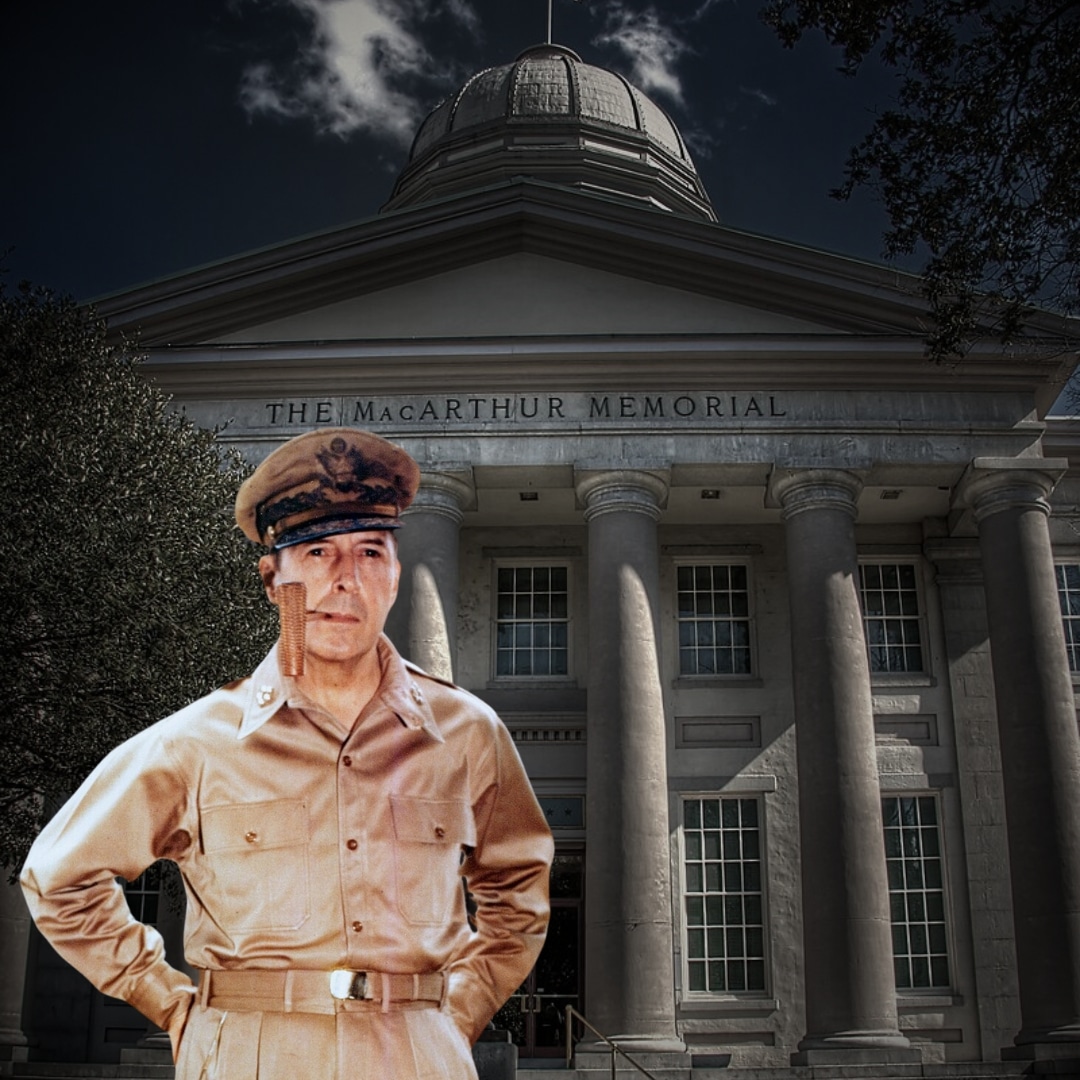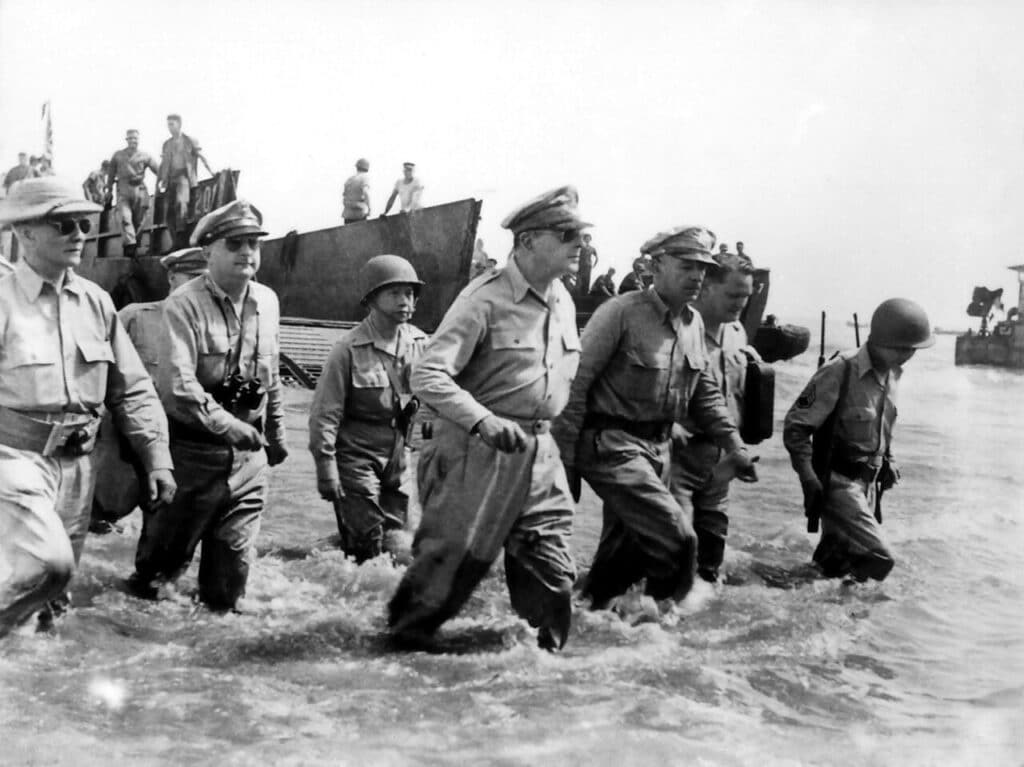
Douglas MacArthur was an iconic and revered military leader known for his extraordinary leadership in World War I, World War II, and the Korean War.
He showcased remarkable strategic insight, particularly through his "island hopping" campaign in the Pacific and the pivotal Inchon invasion. Despite his dismissal during the Korean War, his influence on modern military strategy is enduring.
Douglas MacArthur's early life was steeped in military tradition, laying the foundation for his future as a commanding figure in American military history.
Born on January 26, 1880, in Little Rock Barracks, Arkansas, he was the son of Arthur MacArthur Jr., a respected U.S. Army captain and Medal of Honor recipient. This familial legacy profoundly influenced Douglas MacArthur, who later attended the prestigious military academy at West Point.
Graduating first in his class in 1903, he demonstrated exceptional academic and leadership capabilities. His early career saw him serving as an engineering officer in the Philippines, where he honed his military skills.
These formative experiences were pivotal, setting the stage for his eventual rise to prominence in the military hierarchy.
During World War I, Douglas MacArthur emerged as a distinguished military leader, serving as a key commander in the 42nd (Rainbow) Division.
His exceptional leadership and strategic prowess were particularly evident during the Meuse-Argonne Offensive, where he played a vital role. Recognized for his valor, MacArthur was promoted to the temporary rank of brigadier general, earning multiple military honors, including two Distinguished Service Crosses and seven Silver Stars.
These achievements solidified his reputation as a skilled strategist within the army. After the war, his appointment as Superintendent of the United States Military Academy at West Point further enhanced his prominence.
This period laid the groundwork for his later influential role in World War II, marking the rise of his military prominence.
Following his distinguished service in World War I, MacArthur's military career continued to ascend, culminating in a pivotal role during World War II as the commander of United States Army Forces in the Far East.
In this capacity, he led the defense against the Japanese invasion of the Philippines. Despite the initial setbacks culminating in the fall of the Philippines, MacArthur's strategic prowess shone through as he escaped to Australia, assuming the role of supreme commander of Allied forces in the Southwest Pacific Area.
There, he implemented the "island hopping" strategy, which effectively severed Japanese supply lines. His command in the Pacific was instrumental in the liberation of the Philippines and culminated in Japan's formal surrender aboard the USS Missouri in 1945.
Amid the turbulent backdrop of the Korean War, Douglas MacArthur's leadership as commander-in-chief of United Nations forces initially showcased his strategic capabilities, particularly with the successful execution of the Inchon invasion in September 1950.
However, his subsequent actions led to controversy. MacArthur's dismissal of critical intelligence reports resulted in a severe underestimation of Chinese troop presence, culminating in significant American losses during the Chinese counteroffensive.
His aggressive strategy, including proposals to advance to the Yalu River and use atomic weapons, strained relations with President Truman.
Citing insubordination and his disregard for presidential authority, Truman dismissed MacArthur in April 1951.
The decision sparked mixed reactions, with MacArthur receiving a hero's welcome in the U.S., while his legacy faced increased scrutiny.
Though Douglas MacArthur's career was marked by both acclaim and controversy, his influence on modern military strategy remains significant.
His "island hopping" strategy during World War II prioritized mobility and efficiency, shaping contemporary tactics in conflict zones. MacArthur's emphasis on combined arms operations, integrating air, land, and naval forces, laid the groundwork for modern joint operations among the U.S. Armed Forces and NATO allies.
His Korean War experiences underscored the critical role of accurate intelligence and maintaining close contact with troops, lessons integrated into current military training.
In addition, his controversial decisions, such as civilian bombings, sparked debates on ethical warfare, influencing today's military doctrines on engagement rules.
MacArthur's bold leadership continues to inspire military leaders in decisiveness and charisma. Like George Washington's strategic mastery, MacArthur's tactics have become a reference point for military strategy discussions.

One of Douglas MacArthur’s most famous moments came after the fall of the Philippines in 1942. Following the Japanese invasion, MacArthur and his forces faced overwhelming odds on the Bataan Peninsula. Ordered to evacuate to Australia by President Franklin D. Roosevelt, he reluctantly left Corregidor Island with his family and staff. Upon reaching Australia, he made his legendary vow:
"I shall return."
This pledge became a rallying cry for American and Filipino forces resisting Japanese occupation. MacArthur, as Supreme Commander of Allied Forces in the Southwest Pacific, committed to making good on his promise. His "island hopping" strategy systematically weakened Japanese defenses, cutting off key supply lines and reclaiming territory.
On October 20, 1944, MacArthur waded ashore on the island of Leyte, marking the beginning of the liberation of the Philippines. Standing before the cameras, he famously declared:
"People of the Philippines, I have returned. By the grace of Almighty God, our forces stand again on Philippine soil."
The Battle of Leyte Gulf followed, one of the largest naval engagements in history, ensuring American dominance in the Pacific. Over the next several months, MacArthur led the successful recapture of Manila and other key regions, ultimately restoring Philippine sovereignty.
His vow, once seen as an impossible promise, became a historic moment of triumph, cementing his status as a heroic and determined leader in military history.
MacArthur's leadership was marked by strategic innovation, bold decision-making, and the ability to inspire and adapt. His successful military campaigns, such as in the Pacific Theater and Korean War, demonstrated his capability to execute complex operations effectively.
Douglas MacArthur is best known for his role as Supreme Commander during World War II and the Korean War, particularly orchestrating the successful Inchon invasion. His leadership in Japan's post-war reconstruction further solidified his historical significance and legacy.
The military leader MacArthur was an influential figure in 20th-century conflicts. Known for strategic brilliance and controversial decisions, his leadership during World War II and the Korean War left a lasting impact on military history and strategic thought.
MacArthur was removed due to insubordination and disagreement with President Truman's policies, particularly his public advocacy for military escalation in Korea, including atomic weapons use. His approach conflicted with the administration's strategy, undermining civil-military relations.
Douglas MacArthur's career remains a study in contrasts, marked by his strategic brilliance and contentious decisions. His leadership during World War II and the reconstruction of Japan showcased his military expertise and visionary governance.
However, his defiance during the Korean War and eventual dismissal highlight the complexities of his character. MacArthur's legacy endures as a tribute to a leader whose remarkable achievements were often accompanied by controversy, leaving an indelible impact on military history and strategy.